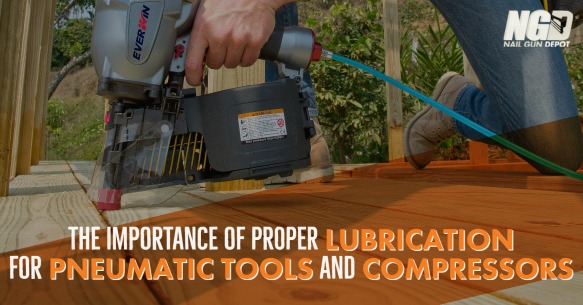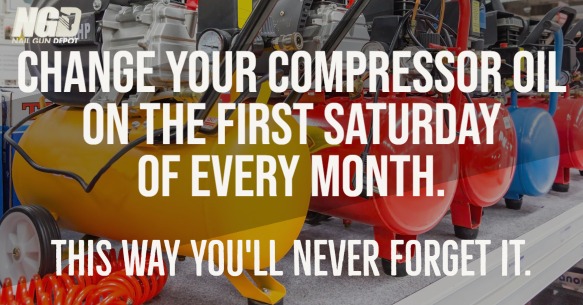Proper Lubrication for Pneumatic Tools and Compressors: A Guide for Construction Professionals

In the construction and industrial fastening industry, proper lubrication is crucial for keeping pneumatic tools and compressors running smoothly and efficiently. However, many end users may not be aware of the importance of lubrication or how to properly lubricate their tools. In this article, we'll discuss the importance of proper lubrication for pneumatic tools and compressors, as well as provide tips on how to do it effectively.

Why Lubrication is Important for Pneumatic Tools and Compressors
Pneumatic tools rely on compressed air to function, and that air needs to move through small passageways and seals in order to do its job. Without proper lubrication, these passageways and seals can become dry and damaged, causing the tool to malfunction or wear out more quickly. Similarly, compressors rely on lubrication to keep the moving parts inside functioning smoothly and to prevent damage.
The Right Type of Oil for Lubricating Pneumatic Tools
When it comes to lubricating pneumatics, it's important to use the right type of oil. Most manufacturers of pneumatic tools, like Senco and Paslode, have their own recommended oils that are specifically designed for their products. These oils are often universal and can be used for all of their pneumatic tools. It's a good idea to check the owner's manual for your specific tool to see what type of oil is recommended.
Scheduling Regular Maintenance and Lubrication
In addition to using the right oil, it's important to lubricate your tools and compressors on a regular schedule. A general rule of thumb is to lubricate your coil nailer daily, adding 25 drops per day. For other air tools, you can decrease the amount to 15 drops per day. For compressors, it is recommended to change the oil every 100-200 hours of use, but a good rule of thumb is to change it every first Saturday of the month. This way you'll never forget it. For the most accurate information on regular maintenance and lubrication schedules for your specific tool or compressor, it's best to consult the owner's manual.

Special Lubricants for Cold Weather and Other Particular Circumstances
There are particular circumstances, such as cold weather, that may require special types of lubricants. NO-TOX 2 is an airline de-icant that can be used in compressors to prevent freezing within the airline in extremely cold temperatures.
Senco's PC1295 Moisture Shield cold weather air tool oil is specially formulated to work in temperatures as low as -20°F, to be used in place of standard pneumatic tool oil for your air-powered staplers and nailers.
When working in cold weather conditions, it's important to use the right type of extension cord to ensure that your electric compressors and tools can perform at their best. Voltec's 12/3 Extreme Cold Weather Extension Cords are designed to withstand temperatures as low as -94°F and are oil and weather resistant with a lighted female end. This ensures that power is delivered to your tools even in the harshest of conditions.
Lubrication to Avoid
When it comes to lubricating your pneumatic tools and compressors, there are a few things to avoid. Petroleum-based oils, such as Marvel Mystery oil or automotive oil, can damage some types of O-rings. Petroleum can make rubbers swell and should be avoided in tools with rubber parts, like O-rings. Similarly, Vaseline is also petroleum-based and should not be used in your pneumatic tools or compressors. WD-40 is not recommended as a lubricant for pneumatic tools as it may not provide the necessary lubrication and can cause deterioration of o-rings as well.

Proper lubrication is essential for maintaining the performance and longevity of pneumatic tools and compressors. By following the tips in this guide, you'll be able to ensure that your tools are lubricated with the right type of oil, lubricated on a regular schedule, and protected against particular circumstances, such as cold weather. Additionally, avoiding the wrong types of lubricants can prevent damage to your tools and prolong their lifespan. Remember, regular maintenance and lubrication is the key to saving time and money in the long run.


